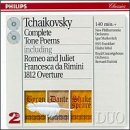| All Artists: Pyotr Il'yich Tchaikovsky, Eliahu Inbal, Igor Markevitch, Bernard Haitink, Frankfurt Radio Symphony Orchestra, New Philharmonia Orchestra, Royal Concertgebouw Orchestra Title: Tchaikovsky: Complete Tone Poems Members Wishing: 1 Total Copies: 0 Label: Philips Release Date: 10/11/1994 Genre: Classical Styles: Forms & Genres, Symphonies, Theatrical, Incidental & Program Music, Historical Periods, Modern, 20th, & 21st Century Number of Discs: 2 SwapaCD Credits: 2 UPC: 028944258622 |
Search - Pyotr Il'yich Tchaikovsky, Eliahu Inbal, Igor Markevitch :: Tchaikovsky: Complete Tone Poems
 | Pyotr Il'yich Tchaikovsky, Eliahu Inbal, Igor Markevitch Tchaikovsky: Complete Tone Poems Genre: Classical
There are some very pleasant surprises here. Not all of this music is top-drawer Tchaikovsky, but the composer also wrote what can only be called very good "bad music." In other words, if something's lacking in melodic ... more » |
Larger Image |
CD DetailsSynopsis
Amazon.com There are some very pleasant surprises here. Not all of this music is top-drawer Tchaikovsky, but the composer also wrote what can only be called very good "bad music." In other words, if something's lacking in melodic charm or formal sophistication, he usually hides it behind a higher-than-average orchestral excitement and hysteria quotient. Fatum is a perfect example: it's slow to get going, but before you know it it's slamming you through the roof on its way to a rousing conclusion, and your overwhelming impression is that you've had a very good time. This may be the weakest work on the disc--all of the others are very good, and a bunch are masterpieces, so if you want all of the Tchaikovsky tone poems in one bargain set, this is a good pick. --David Hurwitz Similarly Requested CDs
|
CD ReviewsPoemas sinfonicos sorprendentes... felipe | Chile | 11/29/2004 (5 out of 5 stars) "La virtud de este CD es tener todos los poemas sinfonicos de Tchaikovsky en una misma compra, pero por cierto ese es su mayor defecto. La calidad es insuperable y la sorpresa de ir de una obra ingeniosa y casi magica a otra es incomparable. Eliahu Inbal es un director de bajo perfil pero de grandiosa calidad y recia direccion, sus versiones del Fatum, el Voyevoda y La tormenta son geniales, para esta ultima Rodesvensky es grandioso. Igor Markevitch toma a su cargo Hamlet, Francesca da Rimini y la obertura 1812, es un gran director ruso y lo demuestra, quizas le falta espectacularidad en la 1812, para Hamlet Dutoit es muy bueno, la 1812 de Ormandy y la de Jarvi son de antologia. Bernard Haitink dirige en forma suprema la fantasia obertura Romeo y Julieta, version alternativa podrian buscar a Leonard Bernstein o Igor Markevitch." Tchaikovsky's best all in one set Benjamin R. Garrison | Lynnwood, WA United States | 11/03/2006 (5 out of 5 stars) "This collection contains two Tchaikovsky war horses: "The 1812 Overture" and "Romeo and Juliet." Both works have been heard millions of times for a good reason--they are great works of music that do not tire easily. I bought this set for another reason, however. "Fatum," "Hamlet," "The Storm," "The Tempest" and "The Voyevode" are all great works that are way under-heard. They don't deserve the relatively obscure status they have received. The first three are performed very well on the first CD and each runs a familiar pattern of dramatic intensity followed by beautiful lyrical themes in the middle. Tchaikovsky was very generous with his melodies and these three works are no exception. Listen for an unusual and compelling ending to "Fatum." It is quite good and includes and unexpected "twist of fate." "The Storm" has several Berlioz-sounding devices which I found quite interesting. The first CD also contains his masterpiece "Francesca da Rimini." The sound quality is excellent, but to me the tempo was a little too fast in the beginning. This makes it more exciting perhaps, but it's almost as if the orchestra is rushing into the whirlwinds instead of lettling listeners be drawn into them. I have other versions that add a lot more artistic flourishes to this music, but still what you'll hear here is flawless if slightly perfunctory. On the 2nd CD, "The Tempest" is one of Tchaikovsky's earlier works. It is also beautiful, but I can't help but think it could use a little editing. It is a bit too long. The real gem of this collection is "The Voyevode" and it is not heard often enough. This set is worth buying for this performance alone. It was one of the last of his orchestral works next to his 6th symphony. One can hear echoes and parallels to his last symphony. "The Voyevode" is one of his most intensely dark, mysterious, desolate--and the most Russian-sounding of any of his works. I have only 2 other versions and this one is by far the best I've heard. This music can easily sound muddy but this performance is rich with dramatic clarity. It was like I was listening to it for the first time--the way it 'should' sound. Listen to this masterpiece and you may be reminded of a Russian winter. At midnight. Spring is so very far away that it seems an impossible hope. But there is a brief respite from the frozen winds on this moonless night: A small fire inside a Russian peasant dwelling provides some feeble warmth. Unlike his other tone poems, there is no love theme here, but it is still splendid and flows like a shot of vodka. Then suddenly SLAM--the door is shut. We are once again lost in the numbing brutality of the Siberian winter. The ending is similar to the 6th symphony only this time it is even less gentle and sympathetic. There is no heartbeat or the slightest speck of hope. Just a Stalin-like cruel ending. Tchaikovsky tore up the score and called it 'rubbish.' This is very curious and indicates the distressed state of mind he was in before he drank the cholera-laden water. Fortunately they reconstructed the work from the remaining orchestral parts. Finally, I'm happy they put the Voyevode and others with this set and not the over-heard "Cappricio Italien." It takes way too long to get going and the main theme tires easily. This set would make a great gift for any Tchaikovsky fan." 38.99+ for New and Used is a Rip-Off Edward C. Carpenter | San Elizario, Texas | 11/28/2007 (3 out of 5 stars) "As an owner of this CD, I find it unfortunate that it's limitied availabilty has driven the price so high. These older recordings are not high fidelity. For the original price of the Phillips 2-CD, I suggest the 2-CD Decca/London recording of the complete tone poems, entitled Tchaikovsky: Orchestral Works, conducted by Dorati. I don't think you'll be disappointed."
|

 Track Listings (4) - Disc #1
Track Listings (4) - Disc #1

